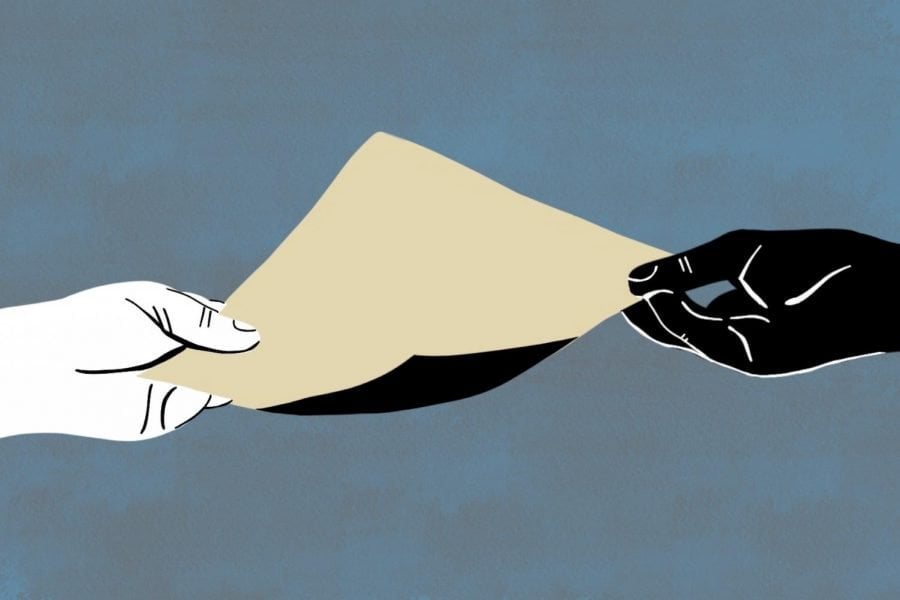‘There is more love somewhere:’ Evanston faith leaders unite to support local reparations fund
Daily file illustration by Emma Ruck
The Reparations Committee approved direct cash payments for two reparations recipients Thursday.
June 13, 2022
Sixteen Evanston faith leaders gathered in Fountain Square Monday afternoon to sign a formal commitment to support the local reparations fund.
“We as religious leaders have moral suasion and responsibility to lead in this area by figuring out a process of reconciliation and atonement, and to help them to lead our community towards healing,” Beth Emet Synagogue Rabbi Andrea London said.
After signing, members of the Unitarian Church of Evanston choir lead attendees in singing “There Is More Love Somewhere,” an aspirational song that emerged out of the horrors of enslavement and continues to empower the ongoing struggle for liberation, London said. Community members linked arms, swayed and sang under the clear blue sky.
Evanston’s current reparations program aims to restore harm caused by discriminatory housing policies from 1919 to 1969. Last March, City Council allocated $400,000 to the Restorative Housing Program, which will give up to $25,000 to Black Evanston residents who either lived in the city during that time frame or are descendants of residents who did. Recipients can use the money to cover a down payment on a new home, pay off an existing mortgage or renovate a property they own.
The Restorative Housing Program is part of a larger reparations effort, which began in June 2019 with Resolution 58-R-19, the city’s “Commitment to End Structural Racism and Achieve Racial Equity.”
The city announced the program’s first recipients this January, distributing funds to 16 of the 122 residents who initially qualified.
First United Methodist Church Pastor Grace Imathiu said a faith-based movement supporting reparations for Black Americans originates with the 1969 Black Manifesto, which asks Christian churches and Jewish synagogues to raise $500 million for reparations as an “act of good faith and true repentance.”
The goal of reparations, Imathiu said, is to acknowledge and compensate for harms perpetuated by structural racism, and for all Americans to reconcile with their pasts.
At the city level, Mayor Daniel Biss said Evanston’s small steps toward reparations are not enough. The project demands urgency, he said, urging the city to direct resources for more immediate change. Biss said the stakes are especially high because Evanston’s reparations program is one of the first in the country.
“If you mess it up you mess it up for everybody else too,” Biss said. “Because the eyes of the nation are on us, we have an especially critical need to be successful.”
U.S. Rep Jan Schakowsky (D-Evanston), urged attendees to support national reparations initiatives in Congress. H.R. 40, a bill proposed by Rep. Sheila Jackson Lee (D-Houston), acknowledges the legacy of slavery nationally and creates a process to consult Black Americans on the best way to redress harms.
The bill, which was first introduced in the 1980s, made it out of the Judiciary Committee and made it to the larger House of Representatives for discussion last year, but progress has since stalled.
Robin Rue Simmons, a former 5th Ward Alderperson who London described as the city’s “architect of reparations,” said the work done in Evanston has inspired hundreds of communities nationwide to look into creating their own reparations programs.
Rue Simmons called on attendees to join her and Schakowsky to demand President Joe Biden pass an executive order for H.R. 40 before Juneteenth, a federal holiday commemorating the emancipation of enslaved black Americans.
“Be encouraged that we’re taking the steps, we’re beginning to see outcomes, we’re beginning to see our community be transformed and supporting Black businesses,” Rue-Simmons said. “We have moved beyond the apology and into the very difficult work of reparations.”
These interfaith groups were part of Monday’s event:
- Beth Emet The Free Synagogue
- Buddhist Council of the Midwest
- Evanston Friends Meeting
- First Congregational Church of Evanston
- First United Methodist Church
- Grace Lutheran Church
- Immanuel Lutheran Church
- Jewish Reconstructionist Congregation
- St. John’s Evangelical Lutheran Church
- Lake Street Church of Evanston
- St. Luke’s Episscopal Church
- Northminster Presbyterian Church
- St. Paul’s Lutheran Church
- United Catholic Youth Ministries
- Unitarian Church of Evanston
Email: [email protected]
Twitter: @yimingfuu
Related Stories:
— Reparations Committee discusses avenues to increase budget by $2.6 million
— Local leaders reflect on Evanston’s reparations effort, one year later












